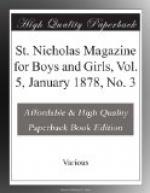Bear the winter off with you, O wild geese
dear!
Carry all the cold away, far away from
here;
Chase the snow into the north, O strong
of heart and wing,
While we share the robin’s rapture,
crying, “Spring! it is spring!”
THE CHARCOAL-BURNERS’ FIRE; OR, EASTER EVE AMONG THE COSSACKS.
(A Russian Legend.)
BY DAVID KER.
“If you want me to tell you any wonderful stories, Barin, such as you’ve been telling us,” says Ostap Mordenko, shaking his bushy yellow beard, as he finished his cup of tea, “you’re just looking for corn upon a rock, as the saying is; for I never had an adventure since the day I was born, except that time when I slipped through a hole in the ice, last winter. But, perhaps, it will do as well if I tell you an old tale that I’ve heard many a time from my grandfather, that’s dead (may the kingdom of heaven be his!), and which will show you how there may be hope for a man, even when everything seems to be at the very worst.
“Many, many years ago, there lived in a village on the Don River, a poor man. When I say he was poor, I don’t mean that he had a few holes in his coat at times, or that he had to go without a dinner every now and then, for that’s what we’ve all had to do in our time; but it fairly seemed as if poverty were his brother, and had come to stay with him for good and all. Many a cold day his stove was unlighted, because he couldn’t afford to buy wood; and he lived on black bread and cold water from the New Year to the Nativity—it was no good talking to him about cabbage soup, or salted cucumber, or tea with lemon in it.[A]
“Now, if he had only had himself to be troubled about, it wouldn’t have mattered a kopeck,[B] for a man can always make shift for himself. But, you see, this man had been married once upon a time, and, although his wife was gone, his three children were left, and he had them to care for as well as himself. And, what was worse, instead of being boys, who might have gone out and earned something for themselves, they were all girls, who could do nothing but stay at home and cry for food, and many a time it went to his heart so that he stopped his ears, and ran out of the house that he mightn’t hear them.
“However, as the saying is, ’Bear up, Cossack, and thou’ll be Maman (chief) some day;’ so he struggled on somehow or other, till at last it came to Easter Eve. And then all the village was up like a fair, some lighting candles before the pictures of the saints; some baking cakes and pies, and all sorts of good things; others running about in their best clothes, greeting their friends and relations; and, as soon as it came to midnight, such a kissing and embracing, such a shaking of hands and exchanging of good wishes, as I daresay you’ve seen many a time in our villages; and nothing to be heard all over the place but ’Christ is risen!’ ’He is risen indeed!’[C]




